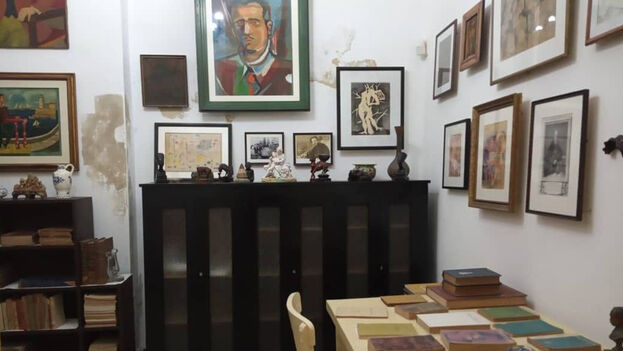
![]() 14ymedio, Xavier Carbonell, Salamanca, 25 September 2022 — Although we are wandering creatures, we are always looking for a home. For no one is a house enough; we must affirm our domain with small ornaments, paintings, touches, ashtrays, scratches on the wall, even breaks. That’s why hotels — no matter how luxurious they are — have something sterile and prostibulary that expel us to welcome the next one.
14ymedio, Xavier Carbonell, Salamanca, 25 September 2022 — Although we are wandering creatures, we are always looking for a home. For no one is a house enough; we must affirm our domain with small ornaments, paintings, touches, ashtrays, scratches on the wall, even breaks. That’s why hotels — no matter how luxurious they are — have something sterile and prostibulary that expel us to welcome the next one.
The trip exists to get home, no matter if it’s real or imaginary. The young people make lists and draw maps, and symbolically anticipate that coming home through small talismans: a lamp, a portrait, a book to which they cling. If these objects represent anything, it is loyalty to ourselves, the confidence that there will be a future and it will be — even in poverty — warm and welcoming.
Nothing is frivolous inside a house; everything has its meaning. Cuban mothers — for whom all junk is a treasure — were enraged when, carelessly, we broke a plate. Or if the cat we raised with care and civility knocked down a vase with its tail.
The secret space between the wall and the door was the favorite hiding place of childhood, as was the interior of the closets, where the jackets and ties of the old people made us sneeze. On the hallway boards, my brother and I marked our height with pencil: our whole life is contained in those lines of graphite, year by year, inch by inch, until we stop growing.
Inside the home there are free spaces and forbidden regions. The first time I opened a drawer, I did it with fear. The wardrobe, formidable, threatening, had three doors. I took hold of the handle and looked, on tiptoe, at the contents of the drawer.
There is no way to list what I saw — what we all saw at some point — because already the memory, treacherous as it is, populated it with false artifacts, invented by me. However, the only thing I clearly distinguish is a pair of gold-mounted mirrors, which belonged to a deceased relative.
Even now I remember the effect they caused on me, when I put them in front of my face: vertigo, dizziness, the terror of looking with the eyes of the deceased. From then on I was more suspicious of drawers.
“The dead should die with their things,” García Márquez wrote with disgust. Nothing worse than looting the memory of those who left. One feels — and rightly so — that he is disrupting the portion of existence that it took others a lifetime to accumulate. However, it’s natural that books, statuettes and lead soldiers don’t hinder the flow of the lives to come. We have to make room for them.
Sentimentality leads me to make only one exception: libraries.
Every reader of Lezama has embarked on the pilgrimage to the house at Trocadero 162, in Havana. There, library and home are one thing. The forgetfulness of the bureaucrats has been good for the place. They haven’t removed the figures that he had on his shelves and that acquire so much meaning in his work. Their gravity remains in the pictures and seats, and it could not be destroyed even by the cyclone that flooded the house a few years ago.
His friends, who still live and remember him, return to that time and to that library. Dislocating the showcases and disrupting the order of the specimens would mean, in a way, burning a fragment of their legacy.
Libraries, therefore, have to survive us.
The last station in the home, the one we have left when we have left or are far away, is the void. It was the master of Trocadero himself, heir to the Chinese dragons and the Japanese sages, who taught us how to taste it. The word is tokonoma, the empty creator of the house, a refuge made of nothing and silence where we can enter and rest.
The emptiness is the “unsurpassed company, the conversation in a corner of Alexandria,” which “surrounds our whole body with a silence full of lights.” There is nothing abstract about this. In fact, it is the only real thing when — in the cold and waiting for the train at the station — we look for the lukewarm interior of our pockets. In the background, intact as a ghost, is the promise of home.
Translated by Regina Anavy
____________
COLLABORATE WITH OUR WORK: The 14ymedio team is committed to practicing serious journalism that reflects Cuba’s reality in all its depth. Thank you for joining us on this long journey. We invite you to continue supporting us by becoming a member of 14ymedio now. Together we can continue transforming journalism in Cuba.
